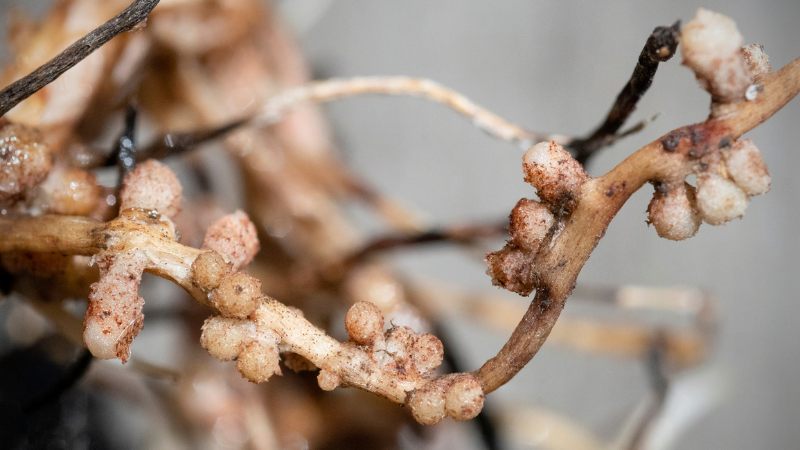How Sulfur Aids Nitrogen Fixation in Legume Crops

Legumes are a staple in many crop rotations. Their ability to replenish nitrogen levels in the soil provides a huge advantage to the following crops – while reducing the need for (and cost of) nitrogen fertilizers. But did you know that legumes rely heavily on sulfur to facilitate nitrogen fixation?
Nitrogen fixation 101
Nitrogen fixation occurs in legume crops due to a symbiotic relationship with rhizobia bacteria (rhizobium). Rhizobia inhabit the root nodules of the plant. The rhizobium exudes nitrogenase, a chemical that converts inert atmospheric nitrogen (N2) into plant-available ammonia (NH3). Ammonia is absorbed by the plant and used to manufacture amino acids, proteins, nucleic acids, and other nitrogen-containing components. The rhizobium receives photosynthate in exchange.
In legumes, this relationship can produce an impressive 25-75 lb of nitrogen per acre per year in a natural ecosystem – and several hundred pounds in a cropping system.
How sulfur is “in on the fix”
Nodulated legumes have a high sulfur demand, and there is a direct correlation between sulfur availability and nitrogen fixation. For example, to grow a 60-bushel soybean crop requires approximately 30 lb of S.
Sulfur plays an important role in nitrogen fixation, particularly in the following areas:
1. Promotes the formation of nodules
Pulse crops suffering from sulfur deficiency have fewer and smaller nodules. Sulfur-deficient nodules contain less leghemoglobin (in the cytosol), glucose, and ATP (adenosine tri-phosphate, a molecule that provides energy to the plant).
2. Supports symbiotic nitrogen fixation
Sulfur is a key ingredient in nitrogenase. Nodules in sulfur-deficient plants will suffer from lower rates of nitrogenase biosynthesis: thus limiting the conversion of nitrogen (N2) to plant-available nitrate (NO3). If the Sulfur is also a key component of numerous enzymes, including ferredoxin (an iron-sulfur compound essential to photosynthesis and nitrogen fixation). Ferredoxin helps the rhizobium assimilate nitrogen.
3. Enhances nodule metabolism
Sulfur also plays an important role in the uptake/transportation of nutrients and enzymes. It is necessary to the formation of proteins and chlorophyl, and facilitates the plant’s ability to efficiently use nitrogen.
Know your sulfur needs before planting a pulse
Before you seed a legume crop, it is advisable to soil test for sulfur levels to avoid the risk of deficiency. You will want to ensure there is an immediate and ongoing source of sulfur when growing legumes so you don’t lose out on all that valuable natural nitrogen – not to mention the associated cost savings and environmental benefits that come with it.




